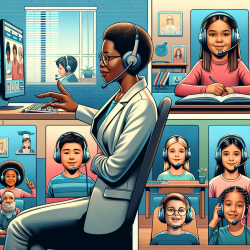In today's rapidly evolving world, bioethical discussions are becoming an essential component of science education. As educators, we are tasked with not only imparting scientific knowledge but also fostering critical thinking and ethical reasoning among our students. The research article "Online Resources for Engaging Students in Bioethical Discussions" by Hawkins and Stark provides valuable insights into how educators can effectively engage students in these important conversations.
The Importance of Bioethics in Education
Bioethics addresses the ethical implications of biological and medical research and practices. With advancements in medical technologies and changing societal norms, new ethical questions arise that challenge our traditional views. Should we pursue certain lines of research given limited resources? Who should benefit from new medical discoveries? These questions are integral to developing students' critical thinking skills and understanding the complexities of modern science.
Utilizing Online Resources for Bioethical Discussions
The article highlights a variety of free online resources that educators can use to introduce bioethical topics to high school and undergraduate students. These resources provide comprehensive curricula, lesson plans, case studies, and frameworks for ethical analysis. By leveraging these materials, educators can create engaging and thought-provoking lessons that encourage students to explore diverse perspectives.
Frameworks for Ethical Analysis
A key feature of the online resources is their use of structured frameworks designed to guide students through ethical controversies. These frameworks help students:
- Identify relevant facts and separate information from emotional responses.
- Recognize stakeholders affected by the outcomes of a situation.
- Clarify stakeholder values, interests, and concerns.
- Make decisions supported by well-reasoned justifications.
By employing these frameworks, educators can facilitate balanced discussions that consider multiple viewpoints without placing personal biases at the forefront.
Diverse Curricular Materials
The Northwest Association for Biomedical Research (NWABR) offers a wealth of curricular materials that include an Ethics Primer and various lesson plans addressing topics like animal research, HIV vaccine research, and stem cell research. These materials align with Common Core State Standards and provide structured strategies for classroom discussions.
The National Institutes of Health's "Exploring Bioethics" curriculum supplement includes modules on sports enhancement ethics, vaccination policies, organ transplantation fairness, genetic testing ethics, and more. These modules utilize a four-question ethical decision-making framework to engage students in meaningful analysis.
The Role of Current Events in Bioethical Discussions
Engaging students with current events related to bioethical issues can capture their interest and make learning more relevant. However, popular media often simplifies complex issues into sound bites. Educators can counteract this by using blogs like The Hastings Center's Bioethics Forum or the Nuffield Council on Bioethics blog to present diverse opinions on ongoing controversies.
Encouraging Further Research
The article encourages educators to explore additional resources like Retraction Watch for insights into scientific integrity or Fear and Loathing in Bioethics for discussions on protecting human research participants. These platforms offer real-world examples that can enrich classroom discussions and inspire students to delve deeper into bioethical topics.
Conclusion
By incorporating online resources into bioethics education, educators can enhance their teaching practice and equip students with the skills needed to navigate complex ethical landscapes. Encouraging critical thinking through structured frameworks and current event analysis prepares students for informed decision-making in their future careers.
To read the original research paper, please follow this link: Online Resources for Engaging Students in Bioethical Discussions.










